Archive for 2021
Escape From Manhattan? Not So Fast Miami
March 16, 2021 As the pandemic raged, word on the street was that fintechs were mulling a Manhattan exodus. Expensive midtown offices didn’t look great compared to Miami beaches.
As the pandemic raged, word on the street was that fintechs were mulling a Manhattan exodus. Expensive midtown offices didn’t look great compared to Miami beaches.
But according to research by Bloomberg, there were no crowds of fleeing New Yorkers like it may have seemed. Only 2,246 people filed a permanent address change from Manhattan to Miami-Dade County, and 1,741 went to Palm Beach County.
3,987 NYC-area residents packed up shop and flew south for the Covid winter, never to return- But that’s only ~5.6% of the total 70,000 people that moved from NY state last year, according to Unicast, a real estate location analytics firm.
“The main problem with moving to Florida is that you have to live in Florida,” Jason Mudrick, a hedge fund manager, told Bloomberg.
In 2019, the US Census Bureau estimated a net 38,512 Greater New York State residents moved to the Sunshine State, suggesting that what was experienced in 2020 may have been nothing more than the routine annual migration. 2020’s Census data is not yet available so it’s difficult to say.
“We’re going to keep going with New York City if that’s all right with you,” Jerry Seinfeld wrote in an August 2020 NY Times Op-ed, “and it will sure as hell be back.”
MSU Spartans Presented by Rocket Mortgage
March 15, 2021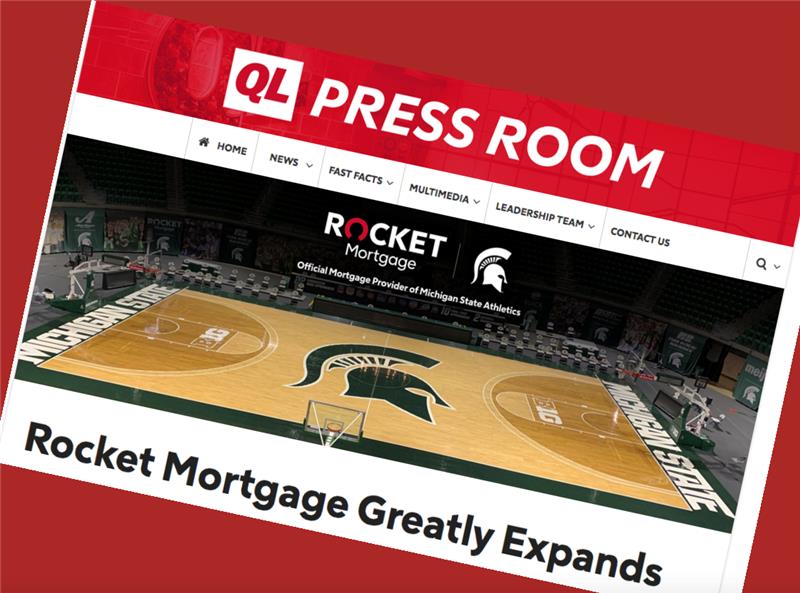 March Madness began with Mortgage madness, in line with 2021. College Basketball fans came to a boil last week when the Michigan Spartans briefly rebranded to a longer name, MSU Spartans Presented by Rocket Mortgage.
March Madness began with Mortgage madness, in line with 2021. College Basketball fans came to a boil last week when the Michigan Spartans briefly rebranded to a longer name, MSU Spartans Presented by Rocket Mortgage.
Fans immediately took to Twitter to complain, as competitors imagined if their beloved teams were also suddenly named after fintech companies. Shortly after, Michigan released a statement claiming they would not be changing their name:
STATEMENT FROM MSU ATHLETICS (MARCH 12):
Michigan State is not renaming its men’s basketball team. While this is a new extension of the partnership for Rocket Mortgage with Men’s Basketball, this is not a first-of-its-kind sponsorship for the Spartans or a new concept in professional or collegiate team partnerships.
Though as some users and news media pointed out, the suffix will still be attached to the team name everywhere at its home games: the rollback is semantics, Rocket Mortgage will still be included in the name, and the logo will appear across the stadium.
“Michigan State University is very important to our company. It is the alma mater of our Founder and Chairman Dan Gilbert, me, and many team members throughout our organization,” Rocket CEO Jay Farner said. “We are honored to contribute to the university that has prepared so many of us for success.”
Strapped for cash, the Detroit Free Press reported the Michigan athletic department is projected to lose $75 million due to the COVID-19 pandemic.
Yahoo Sports writer Jack Baer said that when sports teams take on a corporate name, like the New York Red Bulls, “the business in question actually owns the team rather than giving them millions of dollars to slap their name onto a scoreboard and promotions. In that respect, the MSU Spartans Presented by Rocket Mortgage would be something akin to a little league team getting some help from a local business.”
Rocket Co-founder, Dan Gilbert, has previously donated at least $15 Million to Michigan’s athletics program, overhauling the Breslin Center stadium. Now his Rocket Companies logo will appear everywhere throughout the building.
Some fans still poked fun after the school walked back its original announcement.
Bummer. I was looking forward to taking my family to United Wholesale Mortgage Breslin Center to see the MSU Spartans presented by Rocket Mortgage play on the Auto Owners Insurance Tom Izzo court for a game day experience presented by Farm Bureau Insurance.
— Ryan Peterson (@RyanPD_Peterson) March 12, 2021
Can’t Wait to Become a Bank? Buy One
March 15, 2021 Major fintech companies can’t wait to become chartered banks, and some don’t have the patience to wait for the paperwork to go through.
Major fintech companies can’t wait to become chartered banks, and some don’t have the patience to wait for the paperwork to go through.
Last week, SoFi bought California-based Golden Pacific Bank (GPB) for $22.3 million to speed up its mission to become a nationally chartered bank. SoFi paid for the cash purchase and will apply to take ownership of the bank’s OCC charter- swapping out their pending application to become a bank outright.
“By pursuing a national bank charter, we will be able to help even more people get their money right,” CEO Anthony Noto said. “We are thrilled to have found a partner in Golden Pacific Bank to both accelerate our pursuit to establish a national bank subsidiary, as well as begin to expand our offerings in SoFi’s financial products.”
SoFi, once an anti-bank fintech was preliminarily approved by the OCC for a charter earlier this year.
A year ago Varo started the buy/apply banking trend after receiving approval for an FDIC Bank Charter. LendingClub, a former Peer-to-Peer lender, soon after joined the club by picking up Radius Bank. Square just two weeks ago became a bank, announcing it received an industrial banking license.
Other lesser-known fintechs have been moving toward chartered banking as well. In February, Brex, an online banking fintech, began the process of opening a Utah Based industrial bank as well. Jiko, a small online banking and payments firm, bought Mid-Central National Bank in Minnesota.
There are other up-and-coming fintech banks, like Chime and even blockchain banking contenders, like Figure Technologies. Figure is a home equity lender that is currently applying for a banking charter without the normal FDIC-insured deposits but instead deposits over $250,000 that would act as uninsured high yield loans.
If Sofi’s plan works, the firm aims to contribute $750 million toward digital lending while maintaining GPB’s community banks’ business and branches. The deal should be completed before the end of 2021, and GPB will operate as a division of SoFi Bank.
Prosper Marketplace Posts $18.5M Profit for 2020
March 15, 2021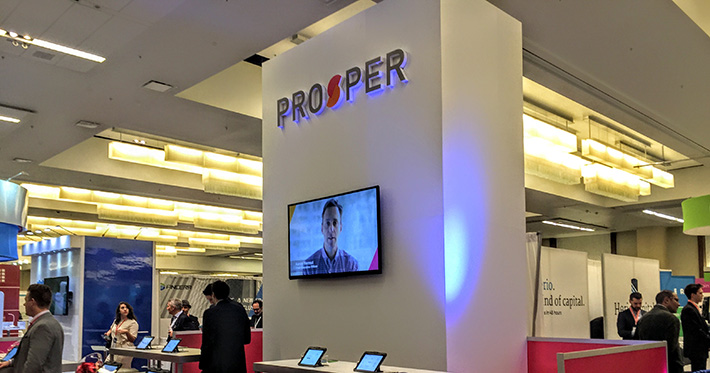 Prosper Marketplace reported a $18.5M profit for 2020, up from a net loss of $13.7M in 2019, marking yet another online lender that successfully weathered Covid.
Prosper Marketplace reported a $18.5M profit for 2020, up from a net loss of $13.7M in 2019, marking yet another online lender that successfully weathered Covid.
In 2020, Prosper originated $1.5B in loans, $1.4B of which were originated through their Whole Loan Channel.
Like Lending Club, the company has long retreated from its peer-to-peer lending roots, but still operates a platform where individual retail investors can buy notes, whereas Lending Club terminated theirs completely.
Prosper generated $100 million in revenue in 2020 and had 353 full-time employees at year-end.
Prosper is not publicly traded but is required to file regular financial statements with the SEC because it sells notes to retail investors.
LendingClub Talks Earnings Post Radius-Bank Acquisition
March 11, 2021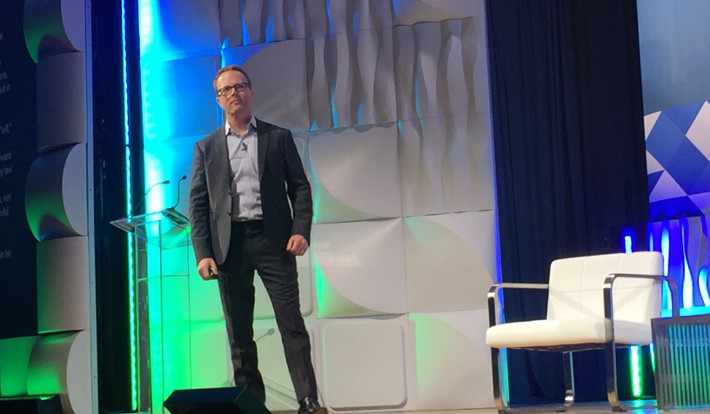 “It’s really hard to imagine a better time to be launching a digital bank,” said LendingClub CEO Scott Sanborn on the company’s Q4 earnings call. “First up, we’ll be building on Radius’ multi-award winning online and mobile deposit offering to make it very easy for our customers to manage their lending, spending and savings in a holistic fashion.”
“It’s really hard to imagine a better time to be launching a digital bank,” said LendingClub CEO Scott Sanborn on the company’s Q4 earnings call. “First up, we’ll be building on Radius’ multi-award winning online and mobile deposit offering to make it very easy for our customers to manage their lending, spending and savings in a holistic fashion.”
The company reported a Q4 net loss of $26.7M on $75.9M in revenue and originated $912M in loans. Their status of being a bank, however, is only just beginning. CFO Tom Casey explained the following:
In addition to lowering our funding cost of deposits, our new marketplace bank will capture significant financial benefits from being a bank and having a marketplace. [….]For every $100 million of loans we originate, we generate about $4 million through an origination and servicing fee when we sell the loans in the marketplace. The vast majority of this fee-based revenue is realized immediately and without requiring a significant amount of capital. However, it is highly dependent on origination volume.
[…]
We can now bolster this revenue stream with bank revenue generated by loans held for investment on our balance sheet. As you can see on the left side of the page, every $100 million of loans we hold on the balance sheet should generate additional marginal profitability of approximately $12 million. And when you compare that to the $4 million in the marketplace, that’s 3 times more. And this recurring revenue is not dependent on originations in any given quarter.
LendingClub experienced unique success during the pandemic, stating that loan performance exceeded their expectations.
“Coming out of the pandemic,” Sanborn said, “the strength of our underwriting has now also been cycle-tested. Losses on loans issued pre-COVID are in line with our pre-pandemic expectations, and loans issued since the pandemic are some of our best-performing loans in recent years.”
Was That Loan Forgiven? The Tax Man Cometh
March 10, 2021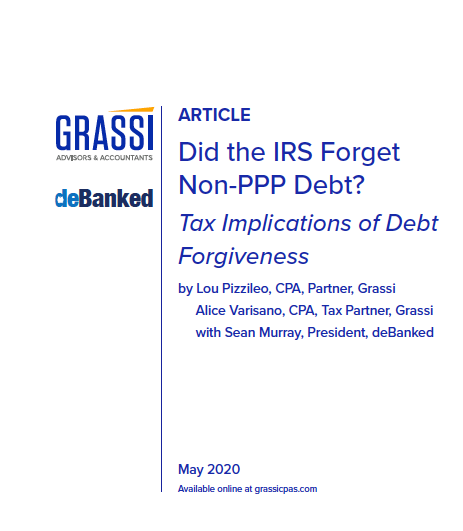 With tax season upon us, the events of 2020 will soon be reviewed and evaluated by everyone’s best friend, the IRS. Lenders that offered debt forgiveness might have done a favor to distressed borrowers in 2020, but a consequence of that courtesy is that the borrowers’ forgiven debt might be taxable.
With tax season upon us, the events of 2020 will soon be reviewed and evaluated by everyone’s best friend, the IRS. Lenders that offered debt forgiveness might have done a favor to distressed borrowers in 2020, but a consequence of that courtesy is that the borrowers’ forgiven debt might be taxable.
This is as good a time as ever to review a report prepared by Grassi Advisors & Accountants whether you are a lender that forgave debt or a borrower that had debt forgiven.
“This issue was noticed early last year,” said deBanked President Sean Murray, “but at the time everyone was so focused on PPP forgiveness, the EIDL program, and government stimulus, that I think the potential consequences of lenders forgiving non-PPP debt for their borrowers were lost in the shuffle. Imagine you’re a borrower that had $100,000 of non-PPP debt forgiven last year and you’re only now about to learn that the IRS may classify that as income. Or worse yet, you don’t even realize it and are told that later on during an audit.”
In May 2020, deBanked labelled this as a hidden tax time bomb that was set to detonate in 2021. And now here we are.
Methodical Ponders if The Roaring Twenties Are Around The Corner
March 9, 2021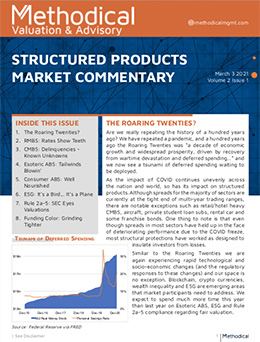 When we last spoke with Gunes Kulaligil, a co-founder of Methodical Management, a valuation and advisory firm, several securitizations in the non-bank finance space had just hit early amortization triggers. That was in late June 2020.
When we last spoke with Gunes Kulaligil, a co-founder of Methodical Management, a valuation and advisory firm, several securitizations in the non-bank finance space had just hit early amortization triggers. That was in late June 2020.
Now that time has passed and the world stabilized, a publication put out by the firm on March 3rd ponders if we are on the verge of repeating the Roaring Twenties of a century ago.
“We have repeated a pandemic, and a hundred years ago the Roaring Twenties was a decade of economic growth and widespread prosperity, driven by recovery from wartime devastation and deferred spending… and we now see a tsunami of deferred spending waiting to be deployed,” the company wrote.
Although spreads for the majority of sectors are currently at the tight end of multi-year trading ranges, there are notable exceptions such as retail/hotel heavy CMBS, aircraft, private student loan subs, rental car and some franchise bonds. One thing to note is that even though spreads in most sectors have held up in the face of deteriorating performance due to the COVID freeze, most structural protections have worked as designed to insulate investors from losses.
“A positive perhaps unexpected consequence of COVID has been the higher savings rates seen than before the pandemic,” the report says. “To be clear, it is a K-shaped recovery and there continues to be distress especially for lower income borrowers, but nowhere near the projected levels pontificated after April 2020’s unemployment number of 14.8% was released. There may continue to be unintended consequences down the road but for now FICOs are up, savings are up, delinquencies are down and this trend is likely to continue as new stimulus packages that are in the works get rolled out.”
Fintech Law Goes into Effect in Mexico
March 9, 2021 It will be a big year for fintech in Mexico, with at least 93 fintech firms in the process of obtaining a Financial Technology Institution (FTI) license.
It will be a big year for fintech in Mexico, with at least 93 fintech firms in the process of obtaining a Financial Technology Institution (FTI) license.
Lawyer Rene Arce Lozano, an advisor with the international Hogan Lovells law firm, wrote about the new “fintech law”; the first of its kind in Latin America. Many firms will see an authorization in the coming year from the National Banking and Securities Commission.
“Over the last few years,” Lozano wrote, “the fintech ecosystem in Mexico has evolved to become one of the most developed in Latin America.”
Mexico, home to 441 startups- the largest fintech hub in central America- passed the law in 2018 that went into effect this past year 2020, nurturing the creation of dozens of Mexican neo banks and electronic payments firms.
The new law sets regulations for payments and open banking and has stirred up excitement for fintech enterprise in the country as a whole. But according to Financial specialist Stefan Staschen, the law isn’t the cure-all.
“The law covers only two types of fintech companies,” Stashen wrote. “It does not provide regulatory guidance for other services, such as fintechs offering balance sheet lending, big tech companies launching financial services, investment services other than crowdfunding, or central bank digital currencies.”
The new law may be a great start, but it is the first step to broader regulatory approval to the diverse financial tech world. Staschen works at the CGAP– an international advocacy group based in Washington that aims to extend financial inclusion throughout the world.





























